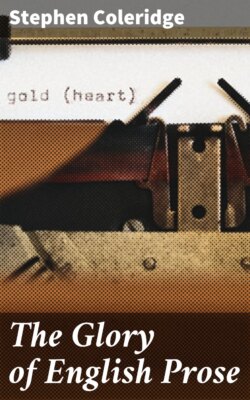Читать книгу The Glory of English Prose - Stephen Coleridge - Страница 10
На сайте Литреса книга снята с продажи.
6
ОглавлениеTable of Contents
My Dear Antony,
I do not think that men of letters often search through the old law reports for specimens of fine prose, but I believe that here and there, in that generally barren field, a nugget of pure gold may be discovered by an industrious student.
Much noble prose delivered from the bench down the centuries has been lost for ever, for the judges of England have often been gentlemen of taste, scholarship, and eloquence. I have found one very splendid passage that has somehow survived the wrecks of nearly four hundred years.
Lord Chief Justice Crewe, who became Chief Justice of England in 1624, delivered in the case of the Earl of Oxford the following noble tribute to the great house of De Vere:—
"I heard a great peer of this realm, and learned, say, when he lived, there was no king in Christendom had such a subject as Oxford. He came in with the Conqueror, Earl of Guienne; shortly after the Conquest made Great Chamberlain, above 400 years ago, by Henry I., the Conqueror's son; confirmed by Henry II. This great honour—this high and noble dignity—hath continued ever since, in the remarkable surname De Vere, by so many ages, descents, and generations, as no other kingdom can produce such a peer in one and the selfsame name and title. I find in all this time but two attainders of this noble family, and those in stormy and tempestuous time, when the government was unsettled, and the kingdom in competition. I have laboured to make a covenant with myself, that affection may not press upon judgment, for I suppose that there is no man that hath any apprehension of gentry or nobleness, but his affection stands to the continuance of so noble a name and fame, and would take hold of a twig or twine-thread to uphold it. And yet Time hath his revolutions: there must be an end to all temporal things, finis rerum—and end of names and dignities, and whatsoever is terrene; and why not of De Vere? For where is De Bohun?—where is Mowbray?—where is Mortimer? Nay, what is more and most of all, where is Plantagenet? They are entombed in the urns and sepulchres of mortality. And yet, let the name and dignity of De Vere stand so long as it pleases God."
And alas! we can now ask, Where is De Vere? This great Earldom of Oxford was created in 1142, and has disappeared long ago in the limbo of peerages said to be in abeyance.
In these days, Antony, when peerages are bought by men successful in trade and sold by men successful in intrigue, such elevations in rank have ceased to be regarded as the necessary concomitants of "great honour" and "high and noble dignity"; so that it has long been more reputable in the House of Lords to be a descendant than an ancestor. But among the older great families there still remains a pride that has descended unsullied through many generations, which serves as a fine deterrent from evil deeds, and a constant incentive to honour—and in England the history of great names can never be totally ignored, even though the country may be ruled by persons who do not know who were their own grandfathers.
Nothing is more ridiculous and cheap than to sneer at honourable descent from famous ancestors; it divertingly illustrates the fable of the sour grapes.
Your loving old
G.P.
